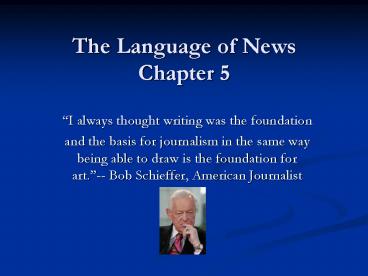The Language of News Chapter 5 - PowerPoint PPT Presentation
Title:
The Language of News Chapter 5
Description:
Bob Schieffer, American Journalist The Language of News Understand the meaning of the words you use and use them properly. ... Avoid Slang Snap! – PowerPoint PPT presentation
Number of Views:77
Avg rating:3.0/5.0
Title: The Language of News Chapter 5
1
The Language of NewsChapter 5
- I always thought writing was the foundation
- and the basis for journalism in the same way
being able to draw is the foundation for art.--
Bob Schieffer, American Journalist
2
The Language of News
- Understand the meaning of the words you use and
use them properly. - Learning what words mean and using them
appropriately are basic skills a journalist must
possess. Look up the word in a dictionary or
style book if you are not sure if you are using
it correctly. Use a different word if you are
not sure. - People expect more of journalists, who must
master the English language. - When news organizations hire a new reporter, they
look for someone who understands and respects the
language, knows spelling and grammar, possesses
an extensive vocabulary and writes in a clear and
interesting manner.
3
Attention to Detail!
- While even careful writers can make mistakes, if
the errors are not caught and become too
numerous, they can damage a news organizations
credibility and force it to print or broadcast
embarrassing corrections. - The importance of precise writingthe correct
choice of words can make a sentence forceful and
interesting imprecision creates confusion and
misunderstanding. - Use strong, descriptive verbs to help readers or
listeners envision the events described in the
stories. - With your words you can paint a vivid picture for
readers and listeners.
4
Avoid clichés like the plague!
- Be careful with adjectives and adverbs since they
tend to be less forceful, specific and objective
than nouns and verbs. Most adjectives and
adverbs waste space by stating the obvious, and
they may unintentionally inject a reporters
opinion into the story. (See examples page 99) - Also avoid clichésthese are words or phrases
that writers have heard and copied over and over.
Only time will tell is the worst cliché, often
used by inexperienced or lazy writers to end a
story. (see full page of clichés on page 101)
5
Avoid Slang Snap!
- Also try to avoid slangfeature stories and
personality profiles sometimes employ slang
effectively, but it is inappropriate in straight
news stories because it is too informal and can
be annoying. - Also, slang may baffle or confuse readers who are
not of the right age or ethnic group to get the
slang reference. - Technical language and jargon should also be
avoided. Most jargon is abstract, wordy,
repetitious and confusing. - Many sources reporters routinely use such as
doctors, lawyers, business people, technical
reports and police and court records, speak in
jargon. - Journalists must translate that jargon into plain
English for a mass audience. Instead of
perpetrator use suspect instead of affiant
use arresting officer.
6
Euphemisms, Platitudesand Gush-- Oh My!
- Also avoid
- Euphemisms vague expressions used in place of
harsher, more offensive terms. Examples saying
that a woman is expecting rather than
pregnant. Passed away instead of died.
Collateral damage for civilian victims.
Harvesting deer or buffalo instead of hunting
(and killing) them. Faith-based groups for
religious groups/churches. - Platitudes these are dull, trite, obvious
remarks that state the obvious. (see examples
page 105). - Gush writing with exaggerated enthusiasm. News
stories should report useful information. They
should not hype, praise or advocatethe sources
you quote or paraphrase can do that, but the
reporter should not. (examples, page 106)
7
Keep I and me out of news stories
- Avoid first-person references (using I and me
in news stories). - Journalists should remain neutral bystanders.
They should not mention themselves in news
stories. Journalists should not use the words
I, me, we, or us, except in a direct
quote from someone interviewed for the story. - Avoid excessive punctuation such as exclamation
points, dashes and parenthesis. Exclamation
points are rarely necessary. Parentheses
interrupt the flow of ideas and force people to
pause and try to figure out some additional bit
of information.



























![Kennedy and Johnson Years [1960-1968]: chapter 21 PowerPoint PPT Presentation](https://s3.amazonaws.com/images.powershow.com/7273766.th0.jpg?_=20201226092)



